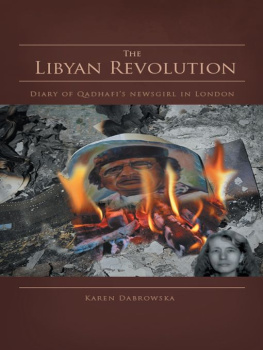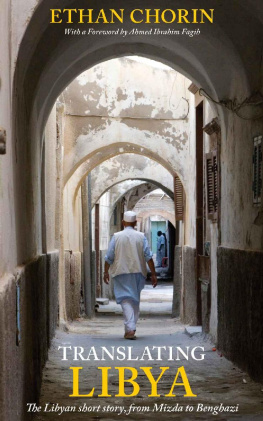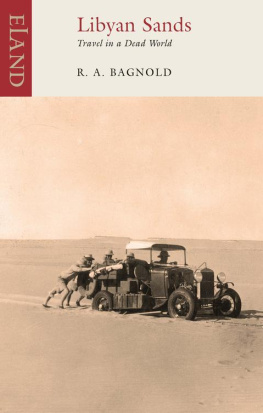Esther Kofod - The Libyan
Here you can read online Esther Kofod - The Libyan full text of the book (entire story) in english for free. Download pdf and epub, get meaning, cover and reviews about this ebook. year: 2013, publisher: Whitfield Press, genre: Home and family. Description of the work, (preface) as well as reviews are available. Best literature library LitArk.com created for fans of good reading and offers a wide selection of genres:
Romance novel
Science fiction
Adventure
Detective
Science
History
Home and family
Prose
Art
Politics
Computer
Non-fiction
Religion
Business
Children
Humor
Choose a favorite category and find really read worthwhile books. Enjoy immersion in the world of imagination, feel the emotions of the characters or learn something new for yourself, make an fascinating discovery.

- Book:The Libyan
- Author:
- Publisher:Whitfield Press
- Genre:
- Year:2013
- Rating:5 / 5
- Favourites:Add to favourites
- Your mark:
- 100
- 1
- 2
- 3
- 4
- 5
The Libyan: summary, description and annotation
We offer to read an annotation, description, summary or preface (depends on what the author of the book "The Libyan" wrote himself). If you haven't found the necessary information about the book — write in the comments, we will try to find it.
The Libyan — read online for free the complete book (whole text) full work
Below is the text of the book, divided by pages. System saving the place of the last page read, allows you to conveniently read the book "The Libyan" online for free, without having to search again every time where you left off. Put a bookmark, and you can go to the page where you finished reading at any time.
Font size:
Interval:
Bookmark:
THE LIBYAN
A Memoir
ESTHER KOFOD
This is my story, a work of creative non-fiction. Some names and identifying details have been changed to protect the privacy of the people involved.
Copyright 2015 Esther Kofod
All rights reserved.
ISBN: 0989054306
ISBN-13: 9780989054300
Library of Congress Control Number: 2013935365
Whitfield Press
Tallahassee, Florida
This book is dedicated to the men and women of Libya who have fought for peace and freedom...
And to the Libyans who will not live to see it happen.
To my children and grandchildren, the lights in my soul
And to my husband, the love of my life

HISTORY OF LIBYA
ROMAN ERA..................................................146 BC - 640 AD
ARAB RULE....................................................640 - 1551
OTTOMAN RULE.1551 1911
ITALIAN COLONIZATION..1911 1934
ITALIAN LIBYA.1934 1943
ALLIED OCCUPATION..1943 1951
KINGDOM OF LIBYA.1951 1969
GADDAFIS DICATATORSHIP.1969 2011
LIBYAN REVOLUTION.February 2011
LIBYAN INDEPENDENCE...October 2011
TABLE OF CONTENTS
CHAPTER 1 Birth in the Desert, 1942
CHAPTER 2 Esther
CHAPTER 3 Washington, D.C.
CHAPTER 4 The Journey Begins
CHAPTER 5 Florida
Chapter 6 Libya
CHAPTER 7 Tripoli
CHAPTER 8 The Bubble Room
CHAPTER 9 Tarek
CHAPTER 10 Sabrata
CHAPTER 11 Gaddafi
CHAPTER 12 Moscow
CHAPTER 13 Kamal
CHAPTER 14 Last Day in Libya
CHAPTER 15 Jamahiriya Airport
CHAPTER 16 Tallahassee
CHAPTER 17 The Betrayal
CHAPTER 18 The Journey Ends
CHAPTER 19 Death in a Foreign Land
EPILOGUE
CHAPTER 1
Birth in the Desert, 1942
After the most intense and brutal battle fought by the Afrika Korps in the Second World War, the strategic port of Tobruk, on the northern shores of Libya, fell to the Germans under Rommel. It was 20 June 1942, and it was a grim outcome for the Libyans. After suffering for years under the Italians led by Rodolfo Graziani, otherwise known as The Butcher of Libya, Libya was now under Nazi control.
In a small stone house on the western coastal town of Sabrata, a very pregnant young woman and her husband were awakened by an urgent loud knock on their front door.
Alarmed, Ibrahim told his frightened wife, Stay here and dont move!
He rushed to the next room and carried two sleeping boys to their mother, gently placing them beside her, nestled in sheep skins for bedding and woven Berber blankets for covers.
I dont know who it is, so be very quiet, he whispered to his wife. He could see that she was scared, and he wanted to reassure her, but the knocking became more persistent. He left the room, closing the door behind him and locked it with the large key that always stayed in the keyhole.
Taking a deep breath, Ibrahim prepared to deal with whoever was outside his house in the middle of the night. He wished now that he had taken Rogaya and his sons to Ramadi weeks ago.
The retreat of the British and the presence of German troops had spurred thousands of Libyans to flee into the desert, to seek refuge from the bombardment and killings. Rumors of atrocities committed by Italian and German troops spread fear and hatred among the people, helpless to protect themselves except by flight.
The Sahara desert to the south, far away from the towns along the Libyan coastline, provided a temporary sanctuary for many. Libyans from cities and towns along the coast returned to their Berber roots, to tribes they had left, who now welcomed them back with open hearts. Their families and tribes shared with them what little they were able to eke out of the arid land by growing barley and raising sheep and goats. Occasionally, even a camel would have to be slaughtered for food. The code of unconditional loyalty and hospitality within the tribes, which had fortified them throughout centuries of foreign domination, now protected them from the threat of atrocities by the Italian and German armies.
When Ibrahim opened the heavy wooden door, he was surprised to see Renato, the Italian who owned the small grocery store in town, standing there.
It is okay, Ibrahim, Im by myself, Renato quickly explained, his distinctive Roman features silhouetted against the night shadows.
Tobruk has fallenthe Germans are already in Tripoli, and will be coming to Sabrata on their way to Tunisia. They could be here by tomorrow!
Renato spoke in a hurried whisper, furtively looking around, listening.
Youre a good man, Ibrahim, and I dont want anything bad to happen to you or your family.
Ibrahim stood still, seemingly calm in his bedclothes, intently listening and absorbing the implications behind Renatos warning.
Renato had risked breaking the curfew imposed by the Italians to warn him, a man for whom he had utmost respect and admiration. He had seen Ibrahim help others over the years, regardless of who they were: Libyan or Italian. He was afraid his friend would not survive the Germans and their rumored cruelties towards the Libyans. He would be too proud and too stubborn to tolerate any form of injustice. Ibrahim was the undeclared Libyan capo or leader of Sabrata.
You know theyve killed many Libyans along the way, and taken whatever they wanted. Those who protested were tortured and killed... Renato paused, seeing Ibrahim flinch in the little light afforded by a quarter moon.
You must leave immediately, my friend, before its too late.
Renato was sweating by now, fearing for his own life. Ibrahim knew it would not have been good for the Italian to be caught talking to a Libyan in the dead of night.
Grazi , Signor Renato. Ibrahim was touched by the mans concern for him and his family. I will, but first let me accompany you back to your house.
No, Ibrahim, you are kind to offer, but I will be safer without you. May God help you and your family and, Inshallah , I will see you again one day.
Quietly and quickly, Renato disappeared into the silence of the night.
After reassuring his wife that everything was going to be alright, Ibrahim Ben Ramadan went about making a pot of strong tea. He took it outside and drank it in the dark, looking up at the stars. His only concern was for his family, and he knew the time had come for him to take them to his familial village of Ramadi, in the desert to the south. Rogaya was eight months pregnant and food was becoming scarce. They had to leave immediately. The British would not give up easily, and Ibrahim feared that Rogaya would not have the strength to live through a birth under those circumstances.
As soon as he got his family to safety, he vowed to himself that he would return to Sabrata to start a resistance movement against the Germans. Swallowing the last of his tea, his mind made up, Ibrahim started preparing for the journey. He gathered the stores they had been able to put by, including jars of olives and Gideed , sundried lamb preserved in olive oil, which Rogaya had saved for the celebration of the babys birth. As the first of the suns rays crept over the house, Ibrahim secured everything to the sides of the camel that he and his younger son, Ali, would ride. On the second camel, which he covered with carpets and sheep skins, he helped his wife settle as comfortably as she was able. Their elder son, Abdullah, rode with his mother so he could help keep her steady on the long bumpy ride.
Are you sure youll be able to make it? Ibrahim asked Rogaya just before they set off. He knew they were doing the right thing, but to undertake this journey at such an advanced stage of pregnancy was an ordeal he wished with all his heart he could spare his wife.
Next pageFont size:
Interval:
Bookmark:
Similar books «The Libyan»
Look at similar books to The Libyan. We have selected literature similar in name and meaning in the hope of providing readers with more options to find new, interesting, not yet read works.
Discussion, reviews of the book The Libyan and just readers' own opinions. Leave your comments, write what you think about the work, its meaning or the main characters. Specify what exactly you liked and what you didn't like, and why you think so.





